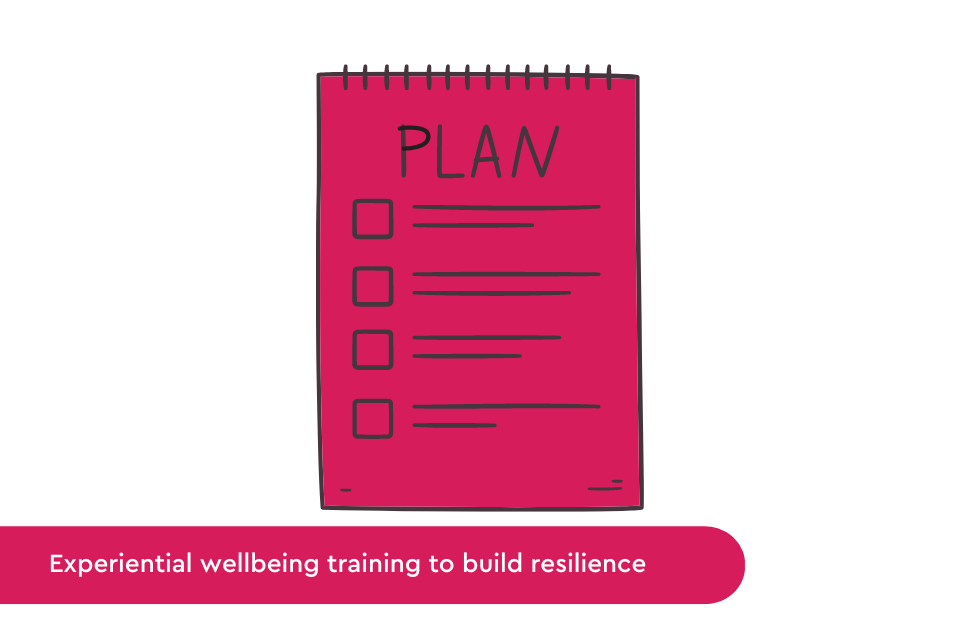A bucket list, or a plan of things you want to achieve and do in your lifetime is beneficial to your wellbeing and can surprisingly have benefits in the workplace. So how can a personal list of aspirations, dreams and actions have positive ramifications at work?
By building a bucket list your focus is positive as you mentally seek out new experiences and challenges. As you write you begin to forget about the negative things in your life and indeed the mundane everyday things. You allow yourself some space to stop, pause and reflect and most importantly dream. This brings with it a positive mindset which aids your wellbeing and will allow you to build confidence, skills that you can take into the workplace.
Read more about transferable wellbeing skills here.
When you think about what you really want to achieve in your life, it encourages goal setting. How exactly are you going to walk the South West Coast Path for example! By thinking through some of your ideas and beginning to plan you will naturally find that your problem-solving skills come to the fore. Goal setting and problem solving can help to give you direction and purpose, both useful skills at work. It also allows employees to take ownership of personal growth.
David Bowie once said; “Always go a little further into the water than you feel you’re capable of being. Go a little bit out of your depth and when you don’t feel your feet are quite touching the bottom, you’re just about in the right place to do something exciting.”
Writing a bucket list often has some challenging achievements that can get you out of your comfort zone. For some that may be climbing a mountain, or trying a new skill, or perhaps you always wanted to belt out a karaoke song at full volume, whatever it is, no matter how big or small, trying new things can help to broaden perspectives, leading to personal growth and newfound confidence. By stepping away and challenging ourselves great ideas or a newfound perspective can enhance our wellbeing. These important wellbeing skills can be bought to the (boardroom) table.
The accomplishment of managing to tick a few items off your wish list can be great for wellbeing. By planning and then achieving you begin to believe in yourself a little bit more and understand how positive actions can bring results. This can keep you motivated as you can see progress and know that it is possible.
Top tip: add a few items on your list that you can achieve in almost any set of circumstances: maybe that’s reading a particular novel, getting in touch with someone you’ve missed, or trying a new food. This will increase optimism and keep that positive mindset engaged.
Priorities will become apparent as you write your list. You may begin to evaluate what is truly important to you and begin to understand your values and boundaries. This can help to bring a sense of order to your life, both outside and inside the workplace. It can help at work by prioritising important tasks and having an idea about resources and time needed.
Motivation is a fantastic aid towards wellbeing. A bucket list helps you to understand the benefits of the workplace and how that can help you to achieve your personal goals. That may be the finances to achieve your ambitions or time away to be with loved ones. It can help you to strip away challenges and see the tangible benefit of what you are working towards, leading to better engaged employees.
Work culture is often something we discuss at huunuu, and burnout is a very real issue. A wellbeing strategy is a good place to start to help prevent burnout, encouraging work-life balance doesn’t mean that staff will suddenly slack off, just the opposite in fact. If people feel that they are valued then they are likely to begin to add value.
Read more about burnout and how you can avoid it here.
Sharing your dreams and goals with others at work can help to create a positive dynamic where people are encouraged to discuss their ambitions. This can lead to better collaboration and team spirit. We can begin to see similarities and learn from others’ differences creating a supportive and emphatic environment. An organisation can be seen as one that actively encourages the growth of their staff and that can lead to retention and happy workplaces.
Work life balance can benefit everyone, read our blog on it here, and an organisation that demonstrates this as a positive can hope for better engagement and wellbeing of their teams. Including a wellbeing training session as part of an away day or team building exercise can proactively encourage a healthy work culture.
If you want to consider experiential wellbeing training, we can help you to build the perfect activity for your organisation: [email protected]
Register your interest for a free online wellbeing bucket list taster session by emailing: [email protected] and head your email, bucket list. Once we have an idea of numbers we can set a date!




